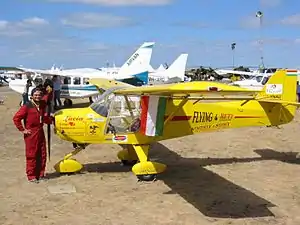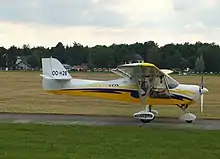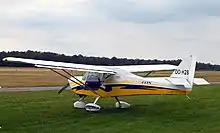Apollo Fox
The Apollo Fox is a Hungarian ultralight and light-sport aircraft produced by Apollo Ultralight Aircraft, of Eger. The aircraft is supplied complete ready-to-fly.[1][2][3]
| Fox | |
|---|---|
 | |
| Role | Ultralight aircraft and Light-sport aircraft |
| National origin | Hungary |
| Manufacturer | Apollo Ultralight Aircraft |
| Status | In production |
| Developed from | Denney Kitfox |
Design and development
The Apollo Fox was derived from the Aeropro Eurofox, which itself was a metric adaptation of the Denney Kitfox. The Kitfox in turn is a derivative of the Avid Flyer.[4] The Apollo Fox was adapted to comply with the Fédération Aéronautique Internationale microlight rules and US light-sport aircraft rules. It features a strut-braced high-wing, a two-seats-in-side-by-side configuration enclosed cockpit, fixed tricycle landing gear or optionally conventional landing gear and a single engine in tractor configuration.[1][2][3][5][6]
The aircraft fuselage is made from welded steel tubing, while the wing is built with aluminum spars and ribs. The fuselage and flying surfaces are covered in doped aircraft fabric. Its 9.15 m (30.0 ft) span wing is supported by V-struts and jury struts and features Junkers-style ailerons. Standard engines available are the 64 hp (48 kW) Rotax 582 two-stroke, the 80 hp (60 kW) Rotax 912UL and the 100 hp (75 kW) Rotax 912ULS four-stroke powerplant. The cabin width is 110 cm (43 in).[1][3][7]
The aircraft's wings fold for storage or ground transportation and can be folded by one person in ten minutes.[7]
Operational history
In 2003 a 100 hp (75 kW) Rotax 912ULS-equipped Fox was flown by Andor Kántás and Csongor Lathky from Sármellék, Hungary to Sydney, Australia, a distance of 25,000 km (15,534 mi).[1][3][7]
Specifications (Fox)


Data from Bayerl and Apollo[1][7]
General characteristics
- Crew: one
- Capacity: one passenger
- Length: 5.80 m (19 ft 0 in)
- Wingspan: 9.15 m (30 ft 0 in)
- Height: 1.7 m (5 ft 7 in)
- Wing area: 11.4 m2 (123 sq ft)
- Empty weight: 284 kg (626 lb)
- Gross weight: 450 kg (992 lb)
- Fuel capacity: 60 litres (13 imp gal; 16 US gal)
- Powerplant: 1 × Rotax 912ULS four cylinder, liquid and air-cooled, four stroke, 75 kW (101 hp)
Performance
- Maximum speed: 200 km/h (120 mph, 110 kn)
- Cruise speed: 150 km/h (93 mph, 81 kn)
- Stall speed: 64 km/h (40 mph, 35 kn)
- Range: 800 km (500 mi, 430 nmi)
- g limits: +4/-2
- Rate of climb: 5 m/s (980 ft/min)
- Wing loading: 39.47 kg/m2 (8.08 lb/sq ft)
References
- Bayerl, Robby; Martin Berkemeier; et al: World Directory of Leisure Aviation 2011-12, page 26. WDLA UK, Lancaster UK, 2011. ISSN 1368-485X
- Bertrand, Noel; Rene Coulon; et al: World Directory of Leisure Aviation 2003-04, page 123. Pagefast Ltd, Lancaster UK, 2003. ISSN 1368-485X
- Tacke, Willi; Marino Boric; et al: World Directory of Light Aviation 2015-16, page 28. Flying Pages Europe SARL, 2015. ISSN 1368-485X
- "EuroFox" (PDF). eurofoxuk.co.uk. Archived from the original (PDF) on 20 June 2012. Retrieved 30 May 2016.
- Experimental Aircraft Association (2012). "Apollo Fox". Archived from the original on 7 March 2012. Retrieved 30 April 2012.
- "Eurofox Sukulaisuus". www.eurofox.fi (in Finnish). Archived from the original on 14 March 2017. Retrieved 1 February 2020.
- Apollo Ultralight Aircraft. "Apollo Fox". Archived from the original on 22 January 2015. Retrieved 30 April 2012.